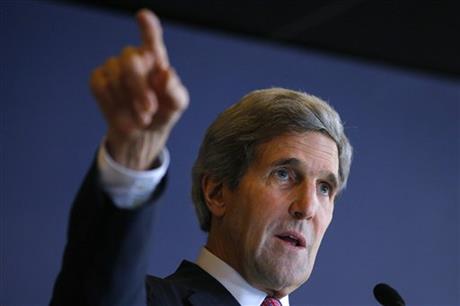MANILA, Philippines (AP) — The United States will provide the Philippines’ security forces with $40 million in new assistance in part to help the country protect its territorial waters amid rising tensions with China over disputes in the South China Sea, U.S. Secretary of State John Kerry said Tuesday.

The money, from a U.S. program known as the Global Security Contingency Fund, will be spent over three years and will be split between improving the Philippines Coast Guard’s maritime security abilities and boosting counterterrorism capacity for the Philippines National Police in the nation’s restive southern islands, where Washington has also backed a decade-long Philippine campaign against al-Qaida-linked local militants.
Kerry announced the assistance during a news conference with Philippines Foreign Secretary Albert del Rosario.
The new aid is intended to complement a $32.5 million assistance package, which Kerry announced Monday in Vietnam, that will help southeast Asian nations protect their territorial waters. Up to $18 million of that money will go to provide the Vietnamese Coast Guard with five new fast patrol boats. Both Vietnam and the Philippines have competing claims with China over territory in the South China Sea and are concerned with growing Chinese assertiveness in the region.
The Philippines lost control of a disputed reef in the South China Sea last year after a standoff with China. The U.S. is also helping equip the Philippines with ships and radar, and is also in negotiations with Manila to increase the American military presence there. However, officials have stressed they have no plans to reopen former military bases.
Tensions with Beijing are running high after a near-collision of U.S. and Chinese naval vessels this month and China’s declaration of an air defense zone over an area that includes territory controlled by Japan, a U.S. ally. Those actions have raised fresh alarm as China modernizes its military and claims a wide swath of ocean and disputed islands across the East and South China Seas.
Kerry’s announcements in the Philippines and Vietnam are almost certain to anger Beijing, which bristles at what it sees as U.S. interference in areas it views as China’s “core interest.” Beijing looks dimly on Washington’s push to increase the U.S. military presence and strengthen its alliances in Asia as it ends a decade of war in Iraq and Afghanistan, calling it an attempt to contain China.
In a reminder of the high stakes in play, U.S. and Chinese naval vessels came close to colliding in the South China Sea on Dec. 5, the most serious incident between the two navies since 2009.
The U.S. Pacific Fleet said Saturday that the USS Cowpens was operating in international waters and had to maneuver to avoid hitting China’s lone aircraft carrier. The Liaoning, a symbol of China’s ambition to develop a navy that operates farther from its own shores, only entered service last year and was on its first sea trials in the South China Sea.
Beijing has not formally commented on the incident, but the state-run Global Times newspaper reported Monday that the U.S. ship had first harassed the Liaoning and its group of support ships, getting too close to a Chinese naval drill and entering within 30 miles of the Chinese fleet’s “inner defense layer.”
As China expands its navy’s reach and starts to challenge decades of American military predominance in the region, it’s becoming more common for vessels of the two nations to operate in close proximity. The Obama administration has made it a priority to seek closer military cooperation with China to prevent misunderstandings that could spark a clash — part of a broader push to foster friendly ties between the established world power and the emerging one.
Beijing’s unilateral declaration in late November of its East China Sea air defense identification zone was a setback, and has ratcheted up tensions with Japan over disputed islands within that zone. All aircraft entering the zone must notify Chinese authorities beforehand, and China has said it would take unspecified defensive measures against those that don’t comply.
The U.S., Japan and South Korea have said they will not honor the new zone, and in a show of defiance soon after China announced it, the U.S. flew two B-52 bombers through the area.
Kerry is in the Philippines on the last leg of a trip to the Middle East and Asia. Before heading for home Wednesday he will visit the Philippine city of Tacloban, which was hard hit by last month’s deadly Typhoon Haiyan. The U.S. was a major contributor of relief after the disaster and Kerry is expected to announce additional support during a brief inspection tour of the storm-ravaged area.





